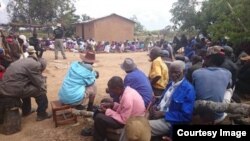After years of experiencing political violence as President Robert Mugabe’s Zanu PF party faced stiff competition from the opposition Movement for Democratic Change, community peace clubs are making a huge difference in helping rebuild shattered lives and communities.
Churches and non-governmental organizations like Heal Zimbabwe Trust have been leading in efforts to bring people together, in particular those in rural communities, through peace clubs.
Heal Zimbabwe Executive Director Rashid Mahiya says communities working with his trust are making strides in propagating the message of peace through neutral collaborative platforms known as nhimbes in Shona.
“These nhimbes have managed to bring people from different political parties and backgrounds to work together for the common good of their communities,” says Heal Zimbabwe Trust.
The main objective of the nhimbes is to bring people together and foster a culture of tolerance within communities where people from diverse cultures and political affiliations can work together.
The peace clubs, says Mbuya Emelda Mhuriro of Mhondoro, Mashonaland West, are making a huge difference on the ground as people from diverse cultures, backgrounds and political affiliations learn to live and work together all over again.
“In Mhondoro we have been blessed that some church leaders have been coming to run conferences on conflict, teaching that there are different types of conflict and how we can work together to resolve them so we can learn to co-exist peacefully despite our differences,” said Mbuya Emelda.
Citing examples of community peace clubs, Heal Zimbabwe Trust says in Mazowe, Ward 9, the Chikukwa Peace Club held several nhimbes in Chikukwa and Majanga village recently.
The nhimbes involved constructing four fowl runs for chickens for other community members. The peace club also initiated community programs for women under the theme; "Positioning Young Women for Community Transformation”.
Sixty women participated as organizers aimed to leverage the vital role that women play in peace building.
“What we have seen is that these meetings are receiving a lot of appreciation from community members, especially for affording women the opportunity to take a leading role in peace building,” said Mahiya.
He says some areas have been difficult to penetrate with some traditional and local political leaders skeptical of the intentions of the peace organizations.
Mahiya says his Trust is working with many peace clubs around the country who are trying to bring people together to work on common areas affecting the communities as they try to deal with perceptions and the polarization that has characterized the Zimbabwean body politic for years now.
A nhimbe is a traditional practice where communities work together to complete a certain task that is beneficial to the community at large, for example constructing bridges or roads.
The nhimbes have also acted as platforms where community members get an opportunity to discuss about the National Peace and Reconciliation Commission (NPRC) and unpack its roles and mandate.
“Such platforms go a long way in bringing communities together, building a culture of tolerance and social cohesion among community members,” says Mahiya.





